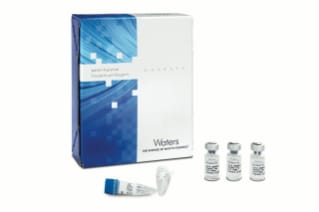
|
Number of Analysis |
24 |
|
Type |
Sample Preparation Workflow |
|
Separation Mode |
HILIC |
|
Detection Method |
HRMS, MS, MS/MS, UV |
|
Storage Condition |
Refer to the storage recommendations of each sub-package |
|
System Type |
LC-MS |
|
Shelf Life |
Refer to the storage recommendations of each sub-package |
|
UNSPSC |
41116104 |
|
Application |
Glycan |
|
Brand |
GlycoWorks |
|
Product Type |
Application Kits |
|
Units per Package |
1 pk |
GlycoWorks Rapid Deglycosylation Kit – 3 x 8
As part of our mission to remain the leader in innovations for biotherapeutic analysis, Waters has reimagined the workflow for the analysis of released N-Glycans. The novel reagent RapiFluor-MS has made it possible to get the ionization capability necessary to maximize information generated during MS detection. This improved workflow speeds up deglycosylation and streamlines the labeling process, meaning biopharmaceutical scientists no longer have to choose between a fast labeling tool and sensitivity for mass spectrometry or rely on difficult and complicated processes that leave room for error. For those using the RapiFluor-MS solution today, the GlycoWorks Rapid Deglycosylation Kit assists with qualifying and validating deglycosylation efficiency.
The GlycoWorks Rapid Deglycosylation Kit can also be used for complementary application areas to compare intact and partial PNGase F deglycosylation for site occupancy information, and intact O-linked analysis. This is shown in application notes provided by Waters with the ACQUITY UPLC Glycoprotein BEH Amide, 300A column and similar lab equipment that offer wide pore stationary phases and optimized amide bonding. This combination provides unprecedented, MS-compatible HILIC based separations for the analysis of intact glycoproteins, glycoprotein fragments, and glycopeptides.
The kit is also available as a part of full solutions like the Glycoworks RapiFluor-MS N-Glycan Kit- 24 Sample and other similar options. These kits are shipped cold with additional shipping and handling fees applied to your cart.
The GlycoWorks Rapid Deglycosylation Kit 3x8 specifically supports the 24 sample protocol, which contains enough reagents to complete 3, 8 reaction sample sets. The kit includes the following:
What Are Some Common Applications for Deglycosylation?
Deglycosylation and the analysis of released N-glycans are often used in biopharmaceutical laboratories. Reasons to deglycosylate a glycoprotein can include the removal of heterogeneity in glycoproteins for X-ray crystallographic analysis and to remove carbohydrate epitopes from antigens. Other applications include: enhancement or reduction of blood clearance rates in glycoprotein therapies, investigation of ligand binding, quality control of glycoprotein pharmaceuticals, simplification of analysis of the peptide portion of the glycoprotein, investigation of the role of carbohydrates in enzyme activity and solubility, and simplification of the analysis of the glycan component via glycan sequencing.